- Home
- Jane Smiley
Barn Blind Page 13
Barn Blind Read online
Page 13
He made them dig. The ovals on Henry’s cheek, three of them, turned red, then purple, and swelled slightly. Father didn’t say anything, however, except “If you’ve got that much energy, then you’ll get this thing dug before lunch.” He had brought water, too. They could see it in the back of the wagon, near the foal, but they didn’t ask for any, and he didn’t offer.
7
AFTER the Fourth of July, the farm grew more serious: blossoms were now small hard fruit on the apple and pear trees, the dandelions had feathered and blown away, camomile and clover were dusty and without fragrance. Everything around the children was the hard green and white of middle summer. As usual, they stood on the roof of the barn to watch the fireworks of neighboring towns, although this year Kate made them get down inside of fifteen minutes because since the death of the foal she didn’t think they ought to be enjoying themselves that much. She had canceled all their entries in the second show of the season, this one a hundred miles north (often, in the past, a cool and refreshing vacation from daily intensifying summer heat). She spoke of responsibilities and privileges and they put their bathing suits back in their dressers. They resigned themselves to waiting for show number three.
Henry pedaled successfully up the far side of the hill, and then even had the energy to wheel down the road and out the gate. Out the gate, onto the blacktop, and the blacktop unfurled beneath him like a revelation. It was smooth! He laughed that he had never thought of it before. All his life he had heard, “Stay off the blacktop, don’t trot on the pavement.” The whole network of slender bones and threadlike tendons and delicate muscle that went to make up the four legs of a horse was put in jeopardy by blacktop. There was nothing that blacktop couldn’t do to a joint. But then, here he was on wheels, hardly pedaling at all, careless of ruts because there weren’t any, letting the sway of his torso make a slalom of the road, going, despite the balloon tires, fast!
When he came to the small concrete bridge that crossed the creek, indicating the northern boundary of the property, he stopped and put his feet down. A car was approaching. He wrestled his bicycle off the bridge into the weeds. The car beeped at him, anyway. He waved. When the car had gone, he was still afraid of the bridge, but also reluctant to turn back. Across the bridge, of course, down the road around numerous but inconsequential curves (distance was meaningless once you were off mother’s property) was town. Between all towns were more blacktop roads. Speed, then, would be possible everywhere, anywhere.
He laid down the bicycle, sat in the weeds, listened to the creek splash over the rocks and concrete blocks beneath the bridge, chewed sour grass, but did not cross. Two cars converged from opposite directions. They slowed. One stopped, the other crossed, then the first one crossed. How then did they know which would stop and which go first? It was a question he had never considered when driving with mother or father, but now such knowledge seemed to symbolize everything that could be learned on the other side of the bridge. He would need money and food, and he had none of either with him. He turned back from the bridge, thinking of ways to get both, and down the steeper hill he held his feet free of the pedals for the first time ever. He blazed between the concrete abutments at the bottom of the drop, eyes watering, ears ringing. At some point there was a wobble, but it failed to deflect him. Everything was perfect.
Kate considered herself aggrieved and angry about the muck the foal had died in. After all these years of training and care with the children, she thought she was disappointed in them for letting her down as paid help would not have. She thought she was expressing this disappointment by hardly speaking to them except to criticize or instruct, but actually her real attention was elsewhere. It was, in fact, with Axel, who was subtly and unaccountably flirting with her.
All of that had been wound up and set aside ten years before. The end had come, not without sorrow for her, after a long struggle over his soul. She had loved that soul, and the good nature, the graceful carriage, the shock of blond hair that went with it. No one had ever made her laugh the way Axel had, teasing her, tickling her, playing jokes upon her and upon himself, contriving with her a hidden, very private life, as if they were clandestine lovers rather than the legal parents of one, two, three, then four children. Births of children and deaths of parents, the financial obligations of the farm, frightful accidents that happened regularly to friends, the horses of friends, the children of friends, even to themselves, all of these had meant sadness but never solemnity, the froth of worry but never compelling anxiety. Her conversion had somehow brought the intrusion of high seriousness into their marriage.
When the soul had become one of their concerns, it had turned out to be not simply a matter of Kate’s taking the children off to Mass every Sunday, and enrolling them in Catholic schools (which possibly were better, anyway). It had turned out that Kate developed a passionate intolerance for the prospect of Axel’s exclusion from heavenly bliss. “You will go to Hell,” she said, “you will. It’s a simple fact.” And he laughed. The lightness, the thoughtlesness of that laugh echoed the laughter that had spilled out of her continually from the first day of their courtship. It was shallow, ignorant. It made her think of the other intimacies they had shared—not her marital duties, exactly, but the stealth and ardor of them, and she recoiled. That phase of her life came to seem aberrant, somehow, as if it would have been all right only if they’d gotten bored together. He continued to tease her. Once he said, “You are truly the most puritanical Catholic I’ve ever seen. The Church forgives, remember?” But she thought he was condescending, and shrank away. Resolute, as always, she relinquished the battle, the husband, the possibility of a normal marriage, and now he was flirting with her.
He came in for dinner early, while she was still stirring the Velveeta Welsh Rabbit, and said, “I walked down the street and turned into a drugstore.” He went on to the bathroom. “Pardon me?” said Kate, but he didn’t repeat himself.
At dinner he was talking to Peter, and he referred to “your dear mother.” Peter started and looked at her. The other children fidgeted in their chairs, but he didn’t sound sarcastic. He complimented her on the food, although everyone, herself included, knew it was awful. On the other hand, he did not offer to do the dishes, and he absented himself after dinner, when it was apparent that she would be alone in the living room.
Other events distracted her. The vet had to come for some kind of eye infection among the yearlings. Henry stepped on a bee, and his lips and eyelids swelled alarmingly, so he had to be rushed to the doctor for shots, then kept in bed for the afternoon. It was hot and he demanded constant drinks of water. He developed a fever. It went down. She made instant pudding, butterscotch, but he complained of the skin on its surface. She asked him why he had taken his shoes off in the first place. He said that he wasn’t hungry. She asked him why he was so infuriating, and he asked her why she was. When Axel came home that night, she was already in bed. She caught herself listening through the wall to his nighttime preparations.
Then she forgot about it, until she began finding things. They were not affectionate things or sentimental things. First it was one of his shoes on the floor of her bedroom, then a copy of The Economist on top of her stack of horse magazines in the living room. Two days after Henry’s recovery, she went into the hall closet to get her rain slicker and found his muffler in the pocket. These were hardly offers, much less gifts. Instead they were incursions into her territory, expressions of some inclination that was not yet clear. That evening he called to say he would be late getting home from work. “Well?” she asked Margaret.
“Nothing. That’s all he said.”
“But he’s always late from work.”
“Yup.”
At last there were a number of gifts. She had put a list of “Absolute Necessities” on the bulletin board: socks, two brassières, rust-colored thread, saddle soap, measuring spoons, thumbtacks. The list disappeared during the day when the vet came back to check on the yearlings, and then, that
evening, she found on the floor of her closet six pairs of socks (white, Bonnie Doon), two Bali bras (with lace), two spools of thread, glycerin saddle soap, five measuring spoons of stainless steel, and two packs of thumbtacks. Nothing, she could see, had been bought on sale, but what could she say? The bras drew her gaze, then the tentative touch of her fingertips. All of hers were white cotton. All of Margaret’s were white cotton. She had seen nothing like these since sorting out her mother’s lingerie years before. She dropped them in her underwear drawer and stirred them around with her hand. They did not mix.
The next day there were a dozen eggs in the refrigerator and a new bag of carrots in the vegetable keeper. The beginnings of the week’s grocery list, which still had five days to build, said, “eggs, carrots.” He neither looked at her more than usual nor smiled nor spoke, but he was waiting for some communication. At first she could not bring herself to make it. Then she found another shoe in her bedroom, this one under the bed. On the grocery list, she wrote, “pâté de foie gras with truffles.” Not long thereafter a small triangular can, haughtily wine colored, appeared on the kitchen table. She smiled in spite of her annoyance.
She really did not have time for this. In the first place, he knew there was another horse show in a week and a half, and then, not two weeks after that, they had to be ready for their own show, a two-day affair with an elaborate combined event planned for a third day. The well-known judge Talbot Light was coming. Many of the Pony Clubbers were riding every day now, so the morning lesson often ran three hours (Axel might realize, if he thought a moment, that it was truly a pain in the neck trying to get these children on by seven-thirty when by rights they should all be mounted before seven) and the older children were schooling two and three horses besides their own. Fences had to be painted, the mares and foals watched with extreme care, and two-year-olds backed sometime soon. It had been lovely, of course, when they’d had no children and only ten horses or so, and nothing really to do, but good Lord, how many hours in the day were there? If he wanted something he could just as well come out and ask for it, rather than making some kind of mystery of it. When she thought about it, she was quite angry. And whose sock was this, stuck in with her underwear? Obviously she would have to talk to him. But, in the end, she shrank from that.
John felt that the proof of his evil nature was complete, but somehow, though it frightened him, it did not depress him. In the mornings he woke up pleased with the 6 A.M. breeze and the leafy treetops against the adamantine blue sky, and during the days he giggled at everything: mother eating carrot strips with a fork, the broad handlebars of Henry’s bicycle, Jeepers’s sneaky nips at the goslings; even Teddy’s evident exasperation with all the accouterments of riding schools rather amused him. He was truly bad; he had become everything that he had always been warned against—callous, deceitful, selfish, thoughtless, sneaky, cruel—and though the thought of one of those words made him gasp when it came to him suddenly, at least it was a relief to know. The perimeters of his future seemed more predictable and therefore more manageable. He was also able to engage Teddy more successfully.
His volts were circular both clockwise and counter; his corners, on the other hand, were as square as could be. At the center of figure eights, Teddy walked his few paces, then took the other lead, whichever one John might desire. His extended trot, though hardly dashing, was competent. His collected trot was best: Teddy’s own surprise at the effort he was putting out appeared as style, uncharacteristic lightness. And he had taken again to jumping. Brick walls, oxers, trekehners, triple in-and-outs painted with garish targets, striped poles, solid poles, crossed poles—Teddy charged over everything in his old style, folding his legs and exerting no more effort than necessary. “Perfect working hunter,” said mother, self-congratulatory. He forgave his mother. It seemed that someone like himself should forgive everyone.
The Teddy problem he solved himself, shortly after the death of the foal, by relinquishing fifteen years of equestrian training. When he wanted something he gave Teddy a spirited thump, preferably where it would hurt the most. No shyness, striving after tact, or fear of damaging the animal with roughness. Trot NOW! Whap! Stop NOW! Jerk! It was brutal, satisfying, and effective. Though he ached to have tried it out at the canceled show, he was otherwise calm about everything with the equanimity of perfect self-knowledge.
They set out on their weekly circuit of the outside course. One by one the riders galloped from jump to jump, with mother shading her eyes, watching what she could from the top of the Irish Bank. The others were trepidatious; once a week they were set free, with nothing to stop chaotic galloping except barbed wire or electric fencing, with nothing between them and the trees (so close together, with such low branches and rough bark). The creek banks too, slides and precipices. The ever possible fall, and loss of the reins, then of the horse itself. A loose horse, tangled in its reins, falling down and breaking something permanent. These horses would do it, too. But John was exhilarated. He took the course fast, more recklessly than it appeared from mother’s distant vantage point. At the slightest notion of hesitation from his mount, he held him in and whipped him over the obstacles. Teddy came home heaving, and mother was surprised at how out of shape he was for this late in the summer. “But resistance,” she said, “is turning your energy against yourself, and it never works. Teddy is just one case in point.” John giggled. She went on. “If you can really ride, if you can understand the wordless partner and make him into an ally, then you have understood something very pertinent about life itself. And I mean understood it not simply with your intellect, for the intellect of itself is rather feckless, but with your heart and body.”
“You’re right, mother.” Kate gave him a smile of ignorant smugness, and he felt profoundly out of her power, lost already, lost at last.
At noon he cleaned his assigned stalls, ate his prescribed lunch of cereal and milk, and later on he rode again, or soaped saddles, or washed the lunch dishes. There was so much work to do that there was endless time to get used to his new condition.
Every night before dinner, he and Peter worked with the two-year-olds. Margaret and Henry did the extra chores while the two brothers ranged the back field in search of the five colts. “Hey,” said John.
“I’m right here.”
“I see them.” In a deeply shaded sycamore copse near the furthest corner of the field, three of the chestnut beauties were eying them skeptically, as if considering the sweetfeed John carried, but also recent rough mysteries that included bars across the tongue and tightness about the ribs. John rattled the feed bucket. “Hey,” he said.
“Well?”
“Have you . . . There’re the other two.”
“Let’s take Holly first, then Boots. The others ought to follow them.”
“Yeah.” He whistled, then flapped the lead line against the bucket in rhythmic enticement. “Hey.”
“What do you want?” The habit of being quiet around horses was an ingrained one.
“Nothing. You go that way and kind of ease them toward me.”
The strategy worked. Sweetfeed was a potent lure, and the colts weren’t all that suspicious, having been handled frequently and tactfully since birth. John slipped the halter over Boots, then fed him a handful of grain and molasses. He liked the animal’s snuffling breath, the long, youthful whiskers, the eager tongue. Peter did the same with Holly. The others would get theirs at the gate.
“Hey,” said John, when they were trudging back toward the barns.
“Hey what? You sound like a broken record.”
“Did you ever kiss anyone?”
“You mean like girls?” Peter was seventeen. Kissing girls had not been much within the scope of his activities, or even his thoughts, though he was not averse to taking advantage of a safe, certain, and desirable opportunity. He said, “Sort of.”
“What does that mean?”
“Louise Browne used to kiss me sometimes when we were in the barn together.”
/> “Oh, yeah?” John was impressed. Louise Browne’s sojourn on the farm as all-round stablehand was four years in the past. “She was old, though.”
“Yeah, she was nineteen.”
“She kissed you, huh?”
“A bunch of times.” Upon consideration, it seemed to Peter that four times could be termed “a bunch.”
“What was it like?”
“I don’t know. Like a kiss.”
“Come on!”
“I don’t know!” They were almost to the gate.
“Well, did she put her tongue in your mouth?”
“I don’t remember.”
“Did you get hard?”
“I guess.”
“Well, Jesus Christ!”
“Well, Jesus Christ to you! It was a long time ago! Open the damned gate!” In any other circumstances he might have said, “the stupid gate” or simply “the gate,” though in an exasperated tone of voice. Even now, as he cursed, he looked up automatically for Kate. John opened the gate, controlled the unhaltered two-year-olds while Peter led Holly through and tied him, then led Boots through. The conversation resumed after the three loose colts had been put into stalls, and Peter was easing a light saddle onto Holly, whose eyes were white and huge with distrust. “Stand up!” barked Peter to the leaning horse, but he barked unfearsomely, almost crooningly. Holly stretched out his nose and ground his teeth. John was holding the lead line. He said, “Anybody since?”
“I don’t know.”
“You must know!”
“I suppose at a party or something.”
“Don’t you care?”
“I don’t know.”
This John could not imagine. He was only fifteen, and he was coming to care very much. “Everybody cares,” he said. “Even the two-year-olds care, for God’s sake.” Kate believed in gelding her colts late, for the sake of size and vitality. Peter eased the girth tighter, one strap, one hole, at a time. Holly kicked out quickly, daringly. “Stop that!” said Peter, firmly, but there were no blows, only a cessation of progress. “Walk him,” he ordered.

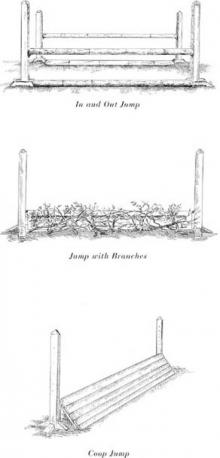 The Georges and the Jewels
The Georges and the Jewels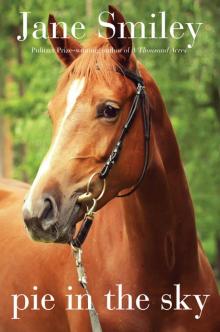 Pie in the Sky: Book Four of the Horses of Oak Valley Ranch
Pie in the Sky: Book Four of the Horses of Oak Valley Ranch Duplicate Keys
Duplicate Keys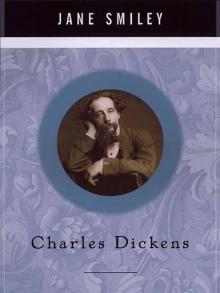 Charles Dickens
Charles Dickens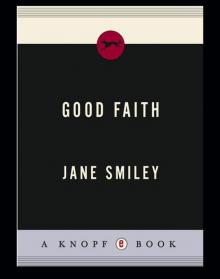 Good Faith
Good Faith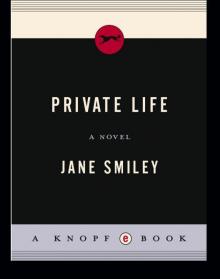 Private Life
Private Life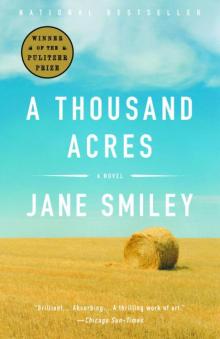 A Thousand Acres: A Novel
A Thousand Acres: A Novel The Greenlanders
The Greenlanders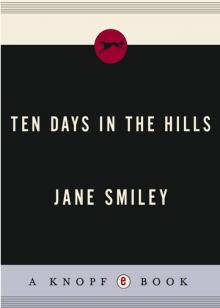 Ten Days in the Hills
Ten Days in the Hills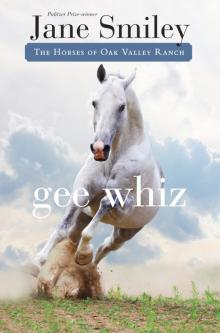 Gee Whiz: Book Five of the Horses of Oak Valley Ranch
Gee Whiz: Book Five of the Horses of Oak Valley Ranch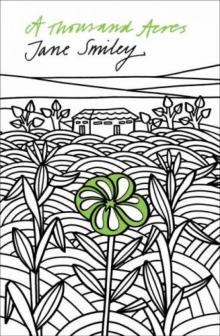 A Thousand Acres
A Thousand Acres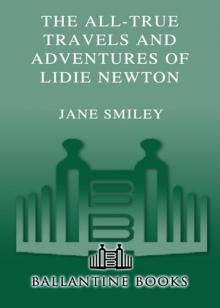 The All-True Travels and Adventures of Lidie Newton
The All-True Travels and Adventures of Lidie Newton Ordinary Love and Good Will
Ordinary Love and Good Will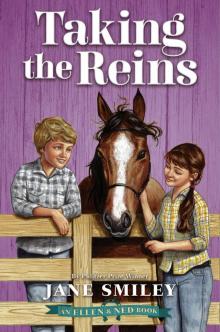 Taking the Reins (An Ellen & Ned Book)
Taking the Reins (An Ellen & Ned Book) The Man Who Invented the Computer
The Man Who Invented the Computer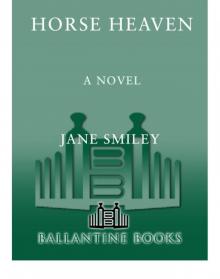 Horse Heaven
Horse Heaven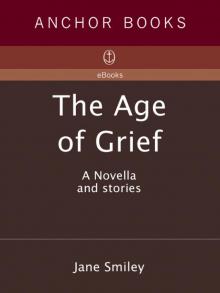 The Age of Grief
The Age of Grief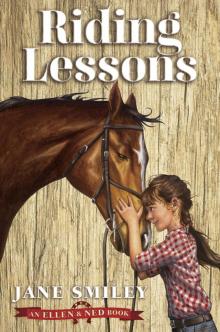 Riding Lessons
Riding Lessons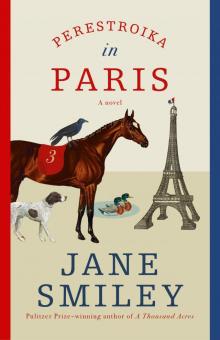 Perestroika in Paris
Perestroika in Paris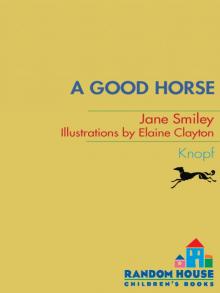 A Good Horse: Book Two of the Horses of Oak Valley Ranch
A Good Horse: Book Two of the Horses of Oak Valley Ranch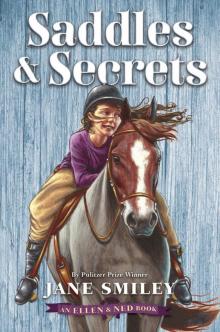 Saddles & Secrets (An Ellen & Ned Book)
Saddles & Secrets (An Ellen & Ned Book)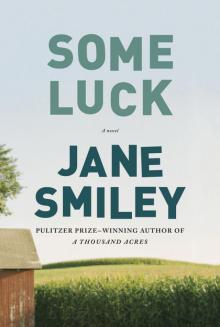 Some Luck: A Novel
Some Luck: A Novel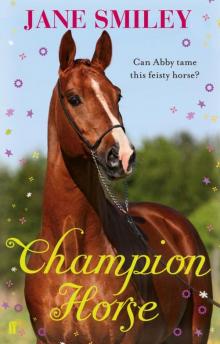 Champion Horse
Champion Horse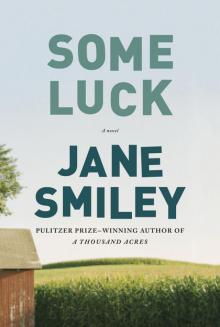 Some Luck
Some Luck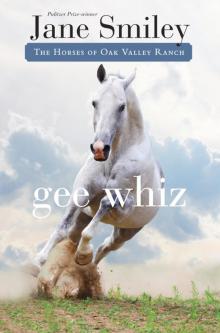 Gee Whiz
Gee Whiz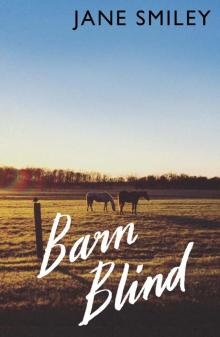 Barn Blind
Barn Blind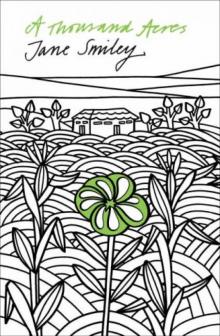 A Thousand Acres (1992 Pulitzer Prize)
A Thousand Acres (1992 Pulitzer Prize)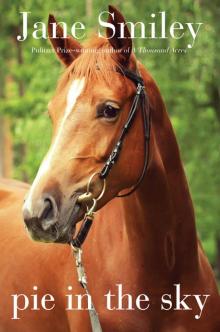 Pie in the Sky
Pie in the Sky True Blue
True Blue A Thousand Acres_A Novel
A Thousand Acres_A Novel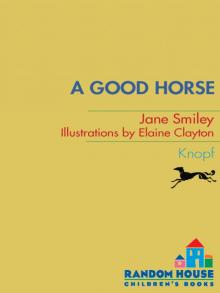 A Good Horse
A Good Horse